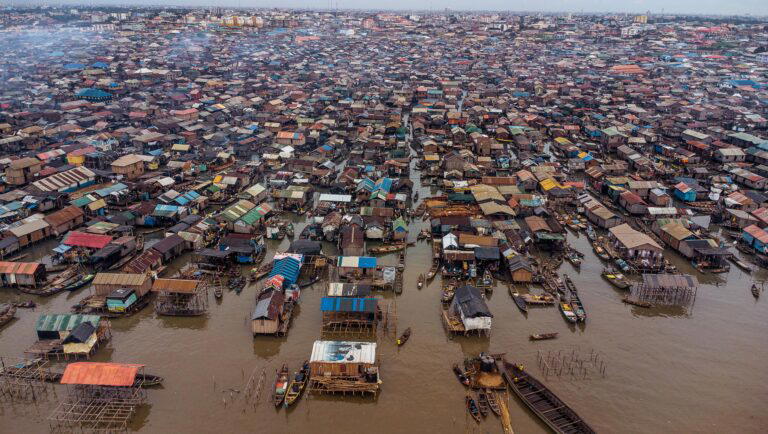Adebote Mayowa never wanted to be a climate activist. He was passionate about photography, and liked to shoot weddings and graduations in his town in Nigeria. One day he read a tweet about a village that was dealing with unprecedented storms, a result of climate change. Thinking it would make for a compelling photo story, he grabbed his camera and caught a flight there.
At COP29, he accepted a third-place award in the international photography competition. Since that first photo story, he has been traveling around his country and beyond, capturing the ugly realities of climate change. Destroyed homes, landfills, floods—his photos display the things we all know to be true about the climate crisis, but often choose to ignore. As he presented at a panel called “Through our Eyes: Visual Artists Perspectives of Climate Change,” I was struck by the emotional response his photographs elicited from the audience. And it makes sense: his pictures show real people experiencing real impacts of a crisis they didn’t cause but are suffering the consequences of.
Two days earlier, I sat in on a different presentation. This one was in the blue, not the green zone, and the audience consisted of only people lucky enough to receive coveted blue zone badges. In this plenary session, delegates from nations gave two-minute speeches. I listened to a few: New Zealand, Estonia, Norway. They were all okay. They said good things like “we’ve come far, but not far enough” and “we must raise our ambition and act decisively, with urgency.” And in between the speeches: silence.
The difference between Adebote Mayowa’s presentation and this plenary session has been on my mind since leaving COP. In one, a passionate man showed examples of devastation caused by climate change, and the audience, mostly average people attending a green zone panel just to learn, left moved but still mostly powerless. In the other, the power in the room was palpable—blue zone officials took up most of the seats—but the speeches were impersonal and, likely, unimpactful. This is the paradox of COP: those with an immense drive to make a difference aren’t able to, and the people most capable of making change don’t bother.
I wonder: if Adebote’s photos could be on display during negotiations, would anything be different? I’m afraid that I know the answer is no. At this point, I don’t think there are many people who can claim ignorance of the issue as an excuse for inaction. I’m not sure what there is to do to make people care more.
Now COP has ended, and for the most part, the world will return to worrying about other things. The additions to Baku Stadium, put in just for the conference, will be torn down, and the people in attendance will go back to work and school and their families and friends. Next year, the world will gather again, this time in Belém, Brazil, to try another time to make meaningful progress toward a better world. Will anything change by then? It’s hard to remain optimistic, but I don’t know if there’s another option.
Amanda McCard is majoring in Journalism and Environmental Studies in the College of Liberal Arts & Sciences.



 One powerful event I attended was the People’s Plenary, themed “Pay Up, Stand Up: Finance Climate Action, Not Genocide,” which broadened my perspective on interconnected justice issues and further emphasized the need for financial action. The plenary featured speakers representing various groups, including indigenous communities, people with disabilities, and populations facing genocide. A mantra repeated throughout the event was that there is no climate justice without human rights; the correlation between these two causes is evident in the ongoing genocide and ecocide in Gaza. Israel’s genocide has killed over 45,000 Palestinians and displaced over 1.9 million people, and its ecocide has intentionally destroyed the natural environment across the Gaza strip. It is impossible to discuss plans of creating a sustainable future without addressing current conflicts, such as the genocide in Gaza, which are inherently unsustainable. Therefore, plenary speakers urged for a reallocation of funding from enabling genocide to supporting climate finance.
One powerful event I attended was the People’s Plenary, themed “Pay Up, Stand Up: Finance Climate Action, Not Genocide,” which broadened my perspective on interconnected justice issues and further emphasized the need for financial action. The plenary featured speakers representing various groups, including indigenous communities, people with disabilities, and populations facing genocide. A mantra repeated throughout the event was that there is no climate justice without human rights; the correlation between these two causes is evident in the ongoing genocide and ecocide in Gaza. Israel’s genocide has killed over 45,000 Palestinians and displaced over 1.9 million people, and its ecocide has intentionally destroyed the natural environment across the Gaza strip. It is impossible to discuss plans of creating a sustainable future without addressing current conflicts, such as the genocide in Gaza, which are inherently unsustainable. Therefore, plenary speakers urged for a reallocation of funding from enabling genocide to supporting climate finance.